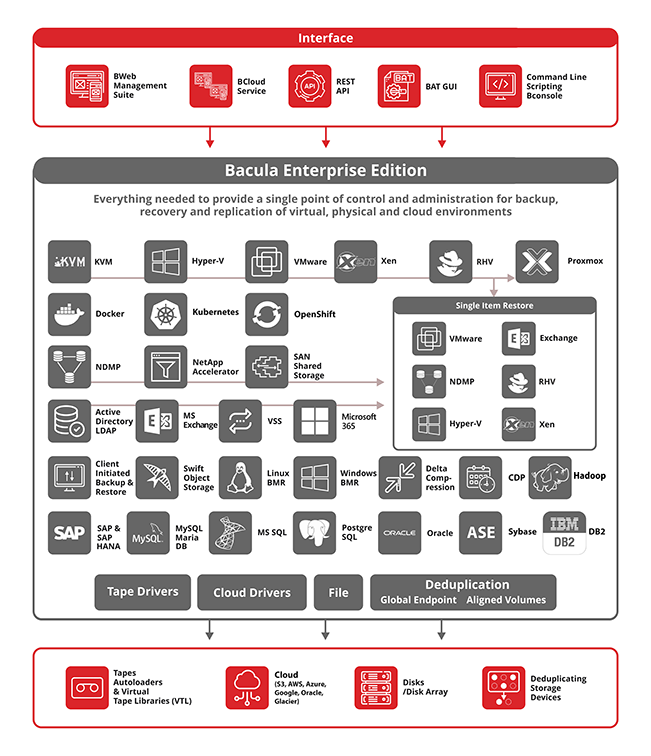Commvault Complete Data Protection (CDP)
Commvault CDP is a versatile platform with three feature categories – centralized data management, data security, and disaster recovery. It can operate with complex systems and environments, creating backups of many types, be it operating systems, databases, applications, and so on. Commvault can also work with physical, virtual, and hybrid environments, making it a solid contender for this list.
4.5/5 score based on 449 customer reviews
Advantages. Commvault proved itself as a stable and reliable solution over multiple years, earning its reputation and a massive number of enterprises as long-time clients. Commvault’s search function receives a lot of praise on a regular basis, and the same could be said for its general versatility and the overall feature set.
Shortcomings. While it is true that Commvault is a relatively old solution with a good reputation, it is not the most user-friendly solution in the world, even by industry’s standards. It is also rather complicated when it comes to initial deployment, with reports of an outdated user interface, and its price tag is significantly above average.
Druva Data Resiliency Cloud
Druva Data Resiliency Cloud is another solution that focuses most of its efforts on protecting and managing data located in the cloud, be it regular cloud storage or application data. Druva can offer data management centralization features, as well as improving data visibility, boosting data security, and more. It is a Software-as-a-Service offering that can perform backup and recovery tasks, in addition to archival, compliance, and other operations.
4.8/5 score based on 596 customer reviews
Advantages. Druva takes pride in its approach to customer data security, with features such as data encryption, data immutability, and many others. It can keep audit trails for as long as the customer wants, there’s a lot of praise towards the effectiveness of customer support, and the overall user experience is deemed praise-worthy by a lot of customers.
Shortcomings. Druva’s backup capabilities with less common data formats, such as SQL clusters or Azure data, are either very basic or straight-up missing altogether. Druva’s data recovery speed is also lower than what most of the competition can offer, and the first-time setup can take a while and cause issues for more casual users of this kind of software.
Veritas NetBackup
Veritas NetBackup is another well-known brand on this market, offering a wealth of features for different types of environments – physical servers, databases, workstations, virtual environments, and many others. Veritas supports public cloud storage providers, as well as tape as a storage type, and boasts plenty of advanced features such as data deduplication.
4.8/5 score based on 413 customer reviews
Advantages. Veritas NetBackup can cover hybrid environments, boost data security, automate various tasks, and so on. General versatility is one of the biggest advantages of Veritas, it puts a lot of emphasis on being able to work with all kinds of data sources and file formats.
Shortcomings. Veritas may work with different business types, but its price is above most of its competition, making it less than viable for the majority of small and middle-sized businesses. Its data restoration speed is slow, and the initial configuration takes quite a while to set up properly.
NAKIVO Backup & Replication
As a data security platform, NAKIVO claims to be able to work with practically any business size, from small companies to massive enterprises. It can offer application-aware incremental backups, instant recovery operations, and many other features. It is also rather versatile in terms of supported backup targets, ranging from workstations on Windows or Linux to databases, applications, Virtual Machines, and more.
4.8/5 score based on 415 customer reviews
Advantages. NAKIVO may not be particularly exceptional in any one specific area, but can still be a solid solution for many companies. It is relatively easy in terms of initial setup, it supports many different types of storage, and most of its capabilities are easy to configure from the get-go.
Shortcomings. NAKIVO’s pricing is not particularly impressive, but it is also not the highest price on this list – a lot of SMBs would perhaps not be able to use it within their budgets. Its reporting capabilities are very basic, and there are a few other features that could also be far more detailed and flexible.
Acronis Cyber Protect
As a data protection solution, the biggest advantage of Acronis is its attention to data security – with features such as blockchain-based authentication, enhanced backup validation, sophisticated ransomware protection, and more. All of that is included in a versatile and user-friendly data protection platform with fast RTOs and a variety of different storage types it can work with.
4.4/5 score based on 305 customer reviews
Advantages. Acronis Cyber Protect is a fast and secure data protection platform, and some of its highest-praised features are storage cloning, centralized data management, and many others.
Shortcomings. Acronis may be somewhat difficult to set up initially, its reporting is rather basic, and is reported to have limited compatibility with databases and hypervisors. The solution itself has somewhat limited scalability and an overhead which can be unacceptable for some users




